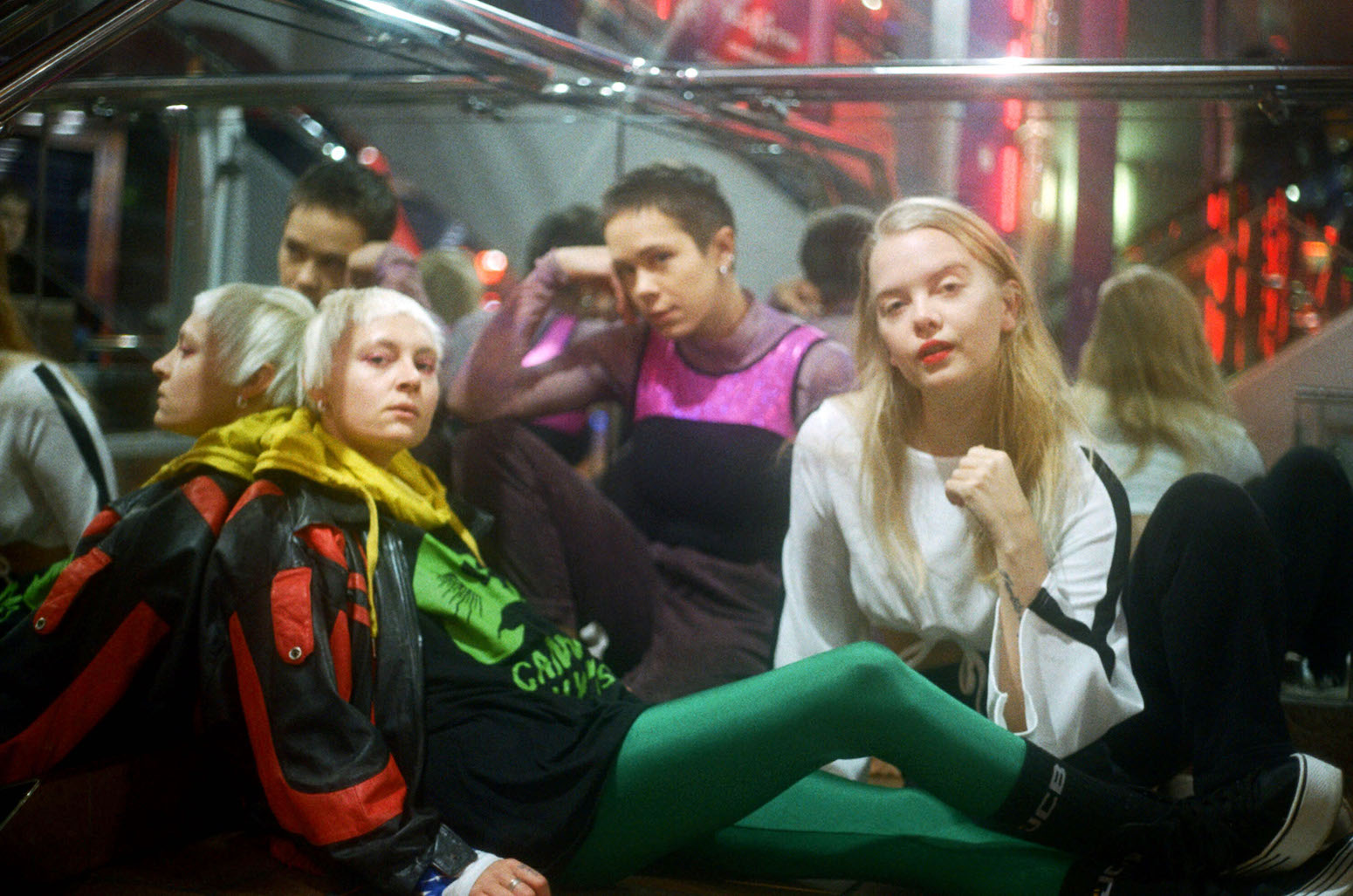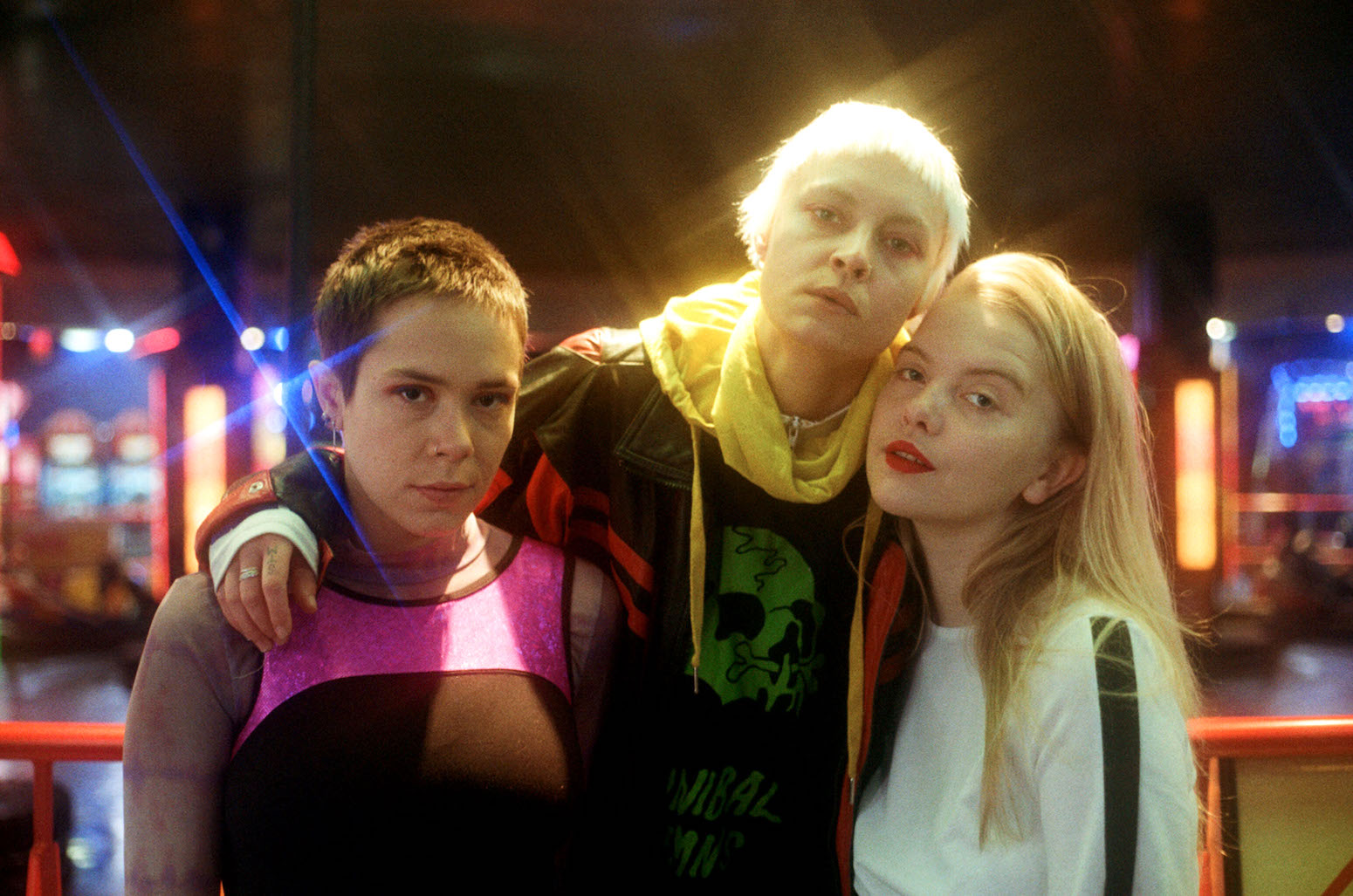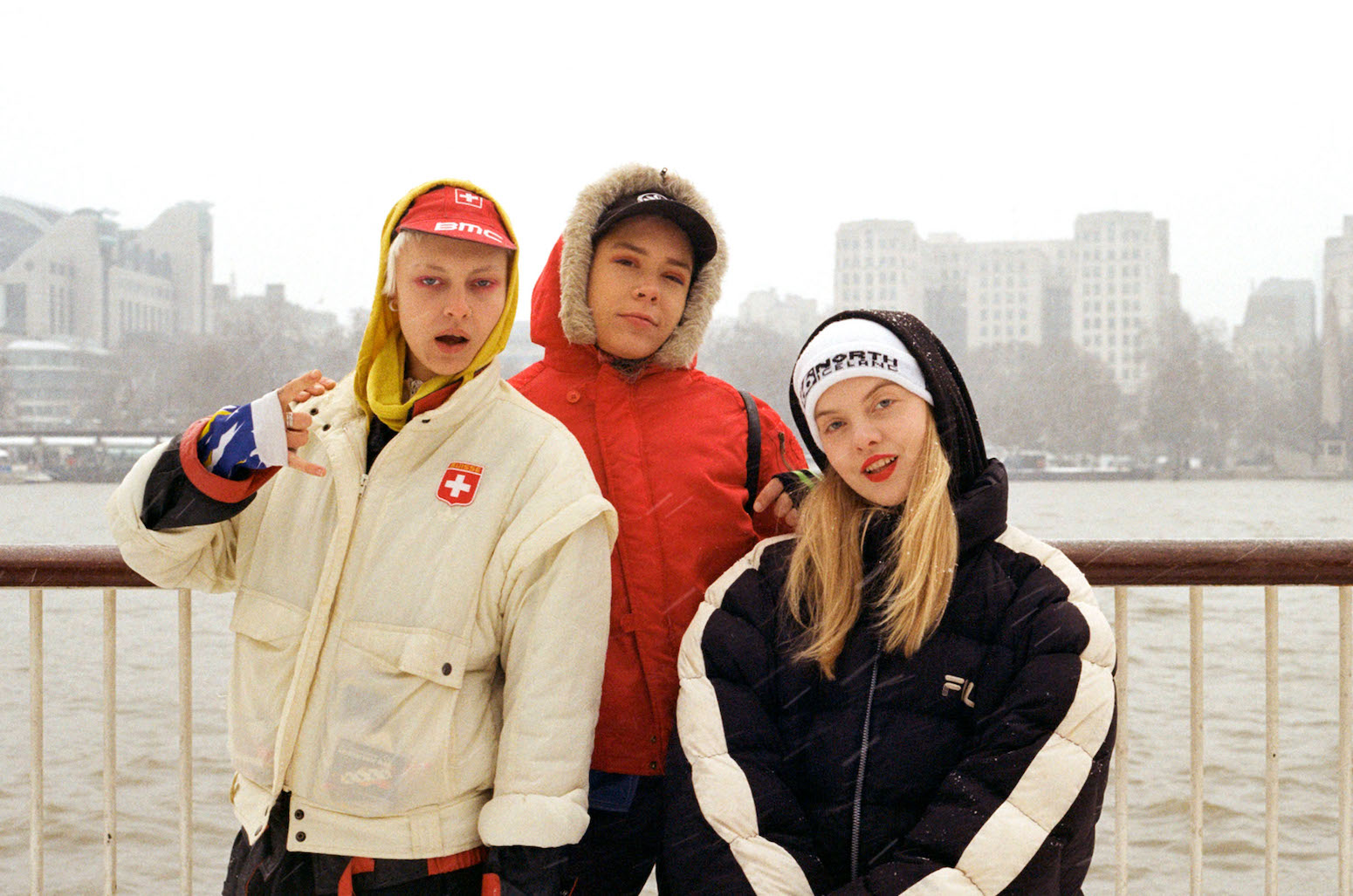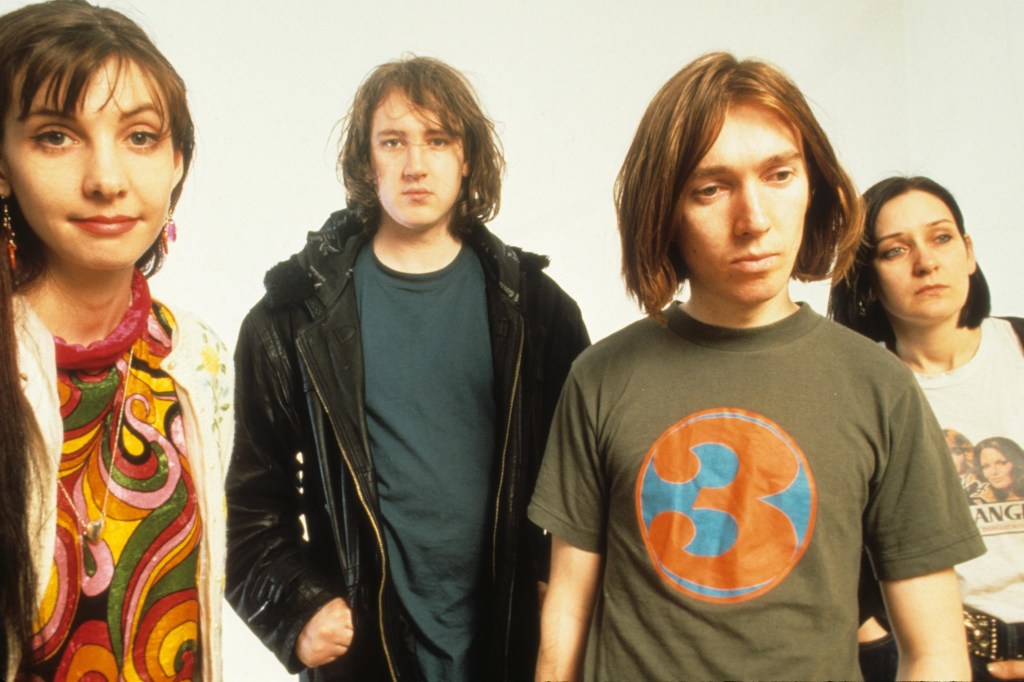It’s midday on a Friday, London is thick with newly fallen snow and Dream Wife and I are being escorted out of an arcade centre by multiple security guards. Apparently we’re not allowed to take photographs in here, although there’s nobody else around, so we don’t see any problem in draping ourselves across the dodgems beneath the twinkling lights. This isn’t my first encounter with the band who have garnered a reputation for their killer live shows, fantastical music videos and gaggle of bad bitches. In fact, I first met them all four years ago at a club in Brighton – back when they used to exclusively wear pastel colours and use a drum machine as a stand-in for the real thing. But despite all that, this is the first time they’ve gotten me into this sort of trouble.
Made up of singer Rakel Mjöll, guitarist Alice Go and bassist Bella Podpadec, Dream Wife found each other at art school in Brighton in 2014. The band’s origin story is somewhat complicated, though, and susceptible to a few false stories. They actually began as one of Rakel’s performance art projects: a “fake band”, which eventually evolved into the real thing and culminated in them hitting the road and touring Canada. In most interviews, this formation is presented as some kind of wildly ‘out there’ occurrence, which perhaps accounts for the multiple rumours surrounding it. “We had so much fake news at one point,” Alice says, once we’ve trekked over the snow to a sushi restaurant on the River Thames’ South Bank. “One was that we were based on this girl’s dream of her growing up in Canada in the 90s. Another was that we entered our Spinal Tap mockumentary into a film contest that we won and the prize was to go to Canada and play Canadian music with them for a film.”
Videos by VICE
In reality, they were three friends with a desire to create things and the motivation to make it happen. Surrounded by talented women who also studied in Brighton, Dream Wife decided to continue the project beyond the confines of school and push it into the community they existed within. Regular tour photographer and collaborator Meg Lavender, for instance, used to throw parties in the basement of her apartment with week-long decorating pre-parties, co-organised by her then housemate and musician Poppy Tibbetts. Maisie Cousins – who has shot everyone from Björk to personal spreads in Polyester, the fashion and culture zine which I edit – directed one of their first ever videos for “Believe” (which can no longer be found online) after meeting the band at her and Meg’s club night Red Light. In other words, from the very beginning, Dream Wife were immersed in an environment abundant in creative energy. So making music was akin to contributing to the scene around them, while also making things happen on their own terms.
Almost four years later and they’ve signed a record deal with Lucky Number, moved away from the seaside into London and pushed their sound out to a global audience. And it’s a sound that’s really worth talking about. They released their self-titled debut album in January, featuring punked up Spice Girls samples (“F.U.U.”, above), an all-out celebration of femme sexuality (“Let’s Make Out”) and upbeat, belting choruses (“Hey Heartbreaker”, “Fire”) that have earned them a reputation as one of the most impactful live bands around right now. To liken them to their riot grrrl predecessors is an easy comparison, but also a bit simplistic. Yes, they’re three women who unapologetically shout and play guitar on stage, command an audience’s full attention and deal with lyrical themes of female empowerment, but their sound doesn’t neatly fit into that mould. They also draw inspiration from New York bands like Yeah Yeah Yeahs, The Strokes and The Kills, twisting femininity and contorting its conventions resulting in an album packed full of great pop tracks that make guitar music feel interesting again.

Even with all that’s happened since their art school days, Dream Wife have retained their collaborative spirit – with a roll call of talented artists, photographers, designers, directors and musicians alongside them. “All of our friends have helped us get where we are, with a lot of them working for free when we had no financial backing,” Rakel says. In that way, their world extends far beyond the music. With visuals that include a prom scene makeout session, a Tank Girl-style female wrestling match and their own take on the cult 70s witchcraft horror film; watching a Dream Wife video conjures up personal memories of waking up mega early to watch music videos on MTV before school. Crediting their art school upbringing and DIY background as the emphasis behind their desire to develop their visuals as much as live shows or recorded material, the trio ensure each individual element is an important piece of artistic work in itself.
But how easy is it to stay true to these DIY roots without exploiting that scene once you obtain a record deal, manager and proper tour van? Well, as Bella says while sipping miso soup, “It’s about acknowledging the DIY scene, and also that were not a DIY band anymore… it’s also about retaining that hands-on attitude with the collaborators and the trajectory creatively, and using our platform to support the people who have and continued to feed into the band. It’s about embracing everyone around you in the position you’re in, and honouring that.” This ‘pay it forward’ attitude endears the band to other creative people – Dream Wife are aware their aesthetic goes some of the way towards their appeal, and trust in the community of artists around them who help bring their visions to life.

To focus wholly on the sound and aesthetic of Dream Wife, though, would be doing them a disservice. They’re active in other ways too. Enter the Bad Bitch Club: a project birthed by the previously mentioned photographer Meg Lavender while she was with them on tour. The Bad Bitch Club turns the camera away from the band and onto their fans in an act of celebrating all the interesting and amazing people attending their shows. “There are only so many photos of a band you can take on stage without getting bored,” Rakel explains. “It started off as Meg documenting us and then she started taking photos of the crowd. We looked at the photos, and the pictures of the people that were coming, and the stories that followed were so interesting.”
Flipping the idea of a fan club on its head, becoming a Dream Wife-certified Bad Bitch is as simple as turning up to a show, having your portrait taken by Meg and ending up on the Bad Bitch Instagram profile. Really though, the Bad Bitch Club fosters a sense of community while also going towards creating a safe, positive space for fans – something that lacks in particular for women and non binary people attending gigs – with Rakel also implementing a ‘bad bitches to the front’ crowd policy (think of it as a more inclusive update of the ‘girls to the front’ Riot Grrrl mantra). By focussing as much on the crowd as the band on stage, the hope is that everyone in the room will feel supported and included in the fun.
When I met the band they were reluctant to bring politics into their musical output. Fast forward to now, though, and they’re working closely with Girls Against, a UK organisation campaigning to to fight against sexual assault at live shows. “At first we found it weird that there was so much emphasis put onto the fact that we are women,” Alice adds. “Also at first when people were asking us ‘have you experienced sexism?’ we would respond no we haven’t had any kind of sexism. Then you look deeper into it and realise oh wait, that is wrong and incorrect.” In rebutting their own experiences, Dream Wife were doing what so many of us do – underplaying what happens to us as to not cause a fuss, or realising the full extent of how something went down long after it happened and how it made us feel. Rakel credits the recent #MeToo movement for helping her come to terms with some of these experiences. “Now I notice so much stuff that I didn’t see as a kid. Why am I angry now, a decade later?”

After spending some time denying their own experiences, the band decided to highlight the endemic issue of sexism and sexual assault within their industry in the form of their own feminist anthem “Somebody”. Writing the track purely from personal experience, Rakel never imagined the impact a single song would have on their audience. But find yourself at any single show and you’ll see it – streams of women screaming the lyrics “I am not my body, I am somebody!” filled with impassioned rage. It’s a line that’s touched such a nerve with their audience that a couple of them have even gone and had the phrase tattooed, and it’s undoubtedly been the catalyst for the band’s more outspoken attitude moving forward.
And while the track may not be wholly typical of Dream Wife’s repertoire – you’re more likely to hear the rest of the album soundtrack a pool party than a protest – it does represent exactly what the band are about. Dream Wife are incubating a community, of not only a chosen few creative people surrounding them, but of a wider group aligning their experiences and expressing themselves through a live show that throbs, music videos that suck you in and songs written to scream your heart out to.
Dream Wife’s debut self-titled album is out now via Lucky Number.
More
From VICE
-

Paul McConnell/Getty Images -

-

(Photo by Steve Eichner/Getty Images) -

Eva Pascoe, founder of Cyberia, poses at the cyber cafe in London. All photos courtesy of Eva Pascoe, Ali Knapp, and Roger Green.
